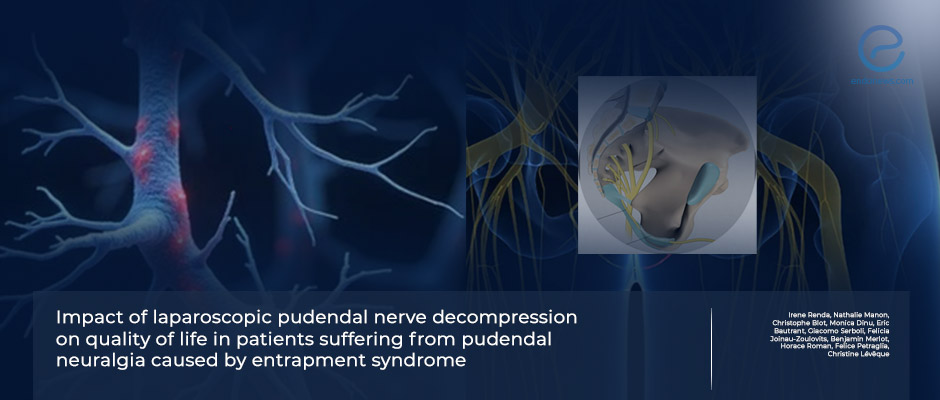Laparoscopic Pudendal Neurolysis: A Solution for Entrapment-Related Pelvic Pain
Jul 3, 2025
Surgical nerve release offers significant relief in pudendal neuralgia and improves urinary, intestinal, and sexual function
Key Points
Highlights:
- Laparoscopic pudendal nerve decompression is a safe and effective treatment for pudendal neuralgia.
- The procedure significantly improves pain, quality of life, and urinary, intestinal, and sexual functions.
- Multidisciplinary care enhances outcomes, especially in patients with central sensitization.
Importance:
- Pudendal neuralgia, caused by nerve entrapment along its anatomical course, leads to debilitating neuropathic pain in the perineum, external genitalia, and anus.
- Chronic pelvic pain in these patients often involves central sensitization, necessitating careful management and tailored surgical approaches.
What's done here:
- This retrospective, monocentric European study assessed quality of life and pain outcomes in 147 patients with pudendal nerve entrapment treated via laparoscopic neurolysis (2018–2023).
- Secondary outcomes included improvements in urinary, digestive, and sexual functions, as well as evaluation of surgical complications.
Key Results:
- Of 147 procedures; 73 were left-sided, 52 right-sided, and 22 bilateral.
- Statistically significant improvements were observed in pain scores, quality of life, and urogenital and gastrointestinal functions.
- The failure rate at 3 years was only 1.7%, while the success rate reached 86.7%.
- Preoperative high pain score was identified as a strong predictor of surgical failure.
- Multidisciplinary preoperative management to reduce pain intensity improved surgical outcomes, particularly in patients with central sensitization and myofascial syndrome.
From the Editor-in-Chief – EndoNews
"This study delivers a compelling case for laparoscopic pudendal nerve decompression as a transformative intervention for patients suffering from pudendal neuralgia—a condition too often overlooked and undertreated. The reported 86.7% success rate, coupled with improvements in pain, urinary, bowel, and sexual function, underscores the multidimensional benefits of this minimally invasive approach.
But the real strength of this work lies in its recognition of complexity. Central sensitization and high preoperative pain scores emerged as critical factors influencing outcomes. The authors’ call for multidisciplinary management—including preoperative pain reduction—reflects an evolved understanding that surgical success depends not only on technical skill but also on holistic patient preparation.
Clinicians are reminded that effective treatment of chronic pelvic pain demands a paradigm shift: from viewing pudendal neuralgia as a niche diagnosis to integrating it into broader pelvic pain algorithms. This paper challenges us to broaden our lens and tailor care pathways that combine surgical innovation with coordinated, patient-centered strategies."
Lay Summary
Pudendal neuralgia is a debilitating condition marked by chronic neuropathic pain in areas innervated by the pudendal nerve, often worsening with sitting and accompanied by urinary, bowel, and sexual dysfunctions. Central sensitization—a heightened nervous system reactivity—affects nearly half of these patients, complicating treatment.
In a recent study published in the Journal of Gynecology Obstetrics and Human Reproduction, Renda and colleagues from the Résilience Center in Aix-en-Provence, France, evaluated the outcomes of laparoscopic pudendal nerve decompression in 147 patients with chronic pelvic pain. This minimally invasive approach was found to be safe and effective, leading to significant improvements in pain, quality of life, and urinary, intestinal, and sexual functions.
At 3 years post-surgery, the failure rate was only 1.7%, with an 86.7% success rate. However, patients with preoperative pain scores (VAS) above 8 were at significantly higher risk of surgical failure, underscoring the importance of multidisciplinary preoperative management to lower pain levels before surgery.
These findings highlight laparoscopic pudendal neurolysis as a promising option for patients unresponsive to medical therapy, particularly when combined with tailored multidisciplinary care.
Research Source: https://pubmed.ncbi.nlm.nih.gov/40294820/
pudendal neuralgia laparoscopic nerve decompression chronic pelvic pain central sentization quality of life nerve entrapment syndrome endometriosis.

